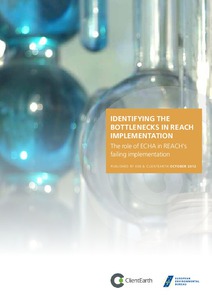Identifying the bottlenecks in REACH implementation: the role of ECHA in REACH's failing implementation
"European companies are failing to produce the legally required information on the chemicals they use and the watchdog that should be making them comply is not doing so, new evidence suggests. A report from the European Environmental Bureau (EEB) and ClientEarth says the chemical industry has l...
| Institution: | ETUI-European Trade Union Institute |
|---|---|
| Format: | TEXT |
| Language: | English |
| Published: |
Brussels
2012
EEB |
| Subjects: | |
| Online Access: | https://www.labourline.org/KENTIKA-19131303124919595859-identifying-the-bottlenecks-in.htm |
| _version_ | 1771659901705125891 |
|---|---|
| collection | Library items |
| description | "European companies are failing to produce the legally required information on the chemicals they use and the watchdog that should be making them comply is not doing so, new evidence suggests. A report from the European Environmental Bureau (EEB) and ClientEarth says the chemical industry has largely failed to provide the necessary data to make the REACH chemical safety law work, adding the European Chemicals Agency (ECHA) has allowed them to get away with it.
The report was released ahead of the European Commission's anticipated report on ECHA's performance. REACH is based on two key legal principles - 'no data, no market' and 'one substance, one registration'. However, the new research found that both of these principles are routinely ignored in the registration of substances, said co-author of the report Christian Schaible at EEB. Co-author Vito Buonsante of ClientEarth added: 'ECHA has already acknowledged that many substances have been inappropriately registered as intermediates by industry in order to avoid information requirements, but our investigation found that on top of this the industry has by and large failed to submit all available test data on substances, as required by REACH. However ECHA is doing little to prevent industry from doing so and is complacent in its compliance checks. Furthermore ECHA is dedicating too little time to work towards the substitution and phase out of hazardous chemicals which European citizens are exposed to every day.' The report says ECHA is shrouded in a culture of secrecy and is under pressure from the chemicals industry which cites 'business confidentiality' as a means to prevent important information being released." |
| format | TEXT |
| id | 19131303124919595859_144a61cb1cfc4d779e61d2b00d7ec68e |
| institution | ETUI-European Trade Union Institute |
| is_hierarchy_id | 19131303124919595859_144a61cb1cfc4d779e61d2b00d7ec68e |
| is_hierarchy_title | Identifying the bottlenecks in REACH implementation: the role of ECHA in REACH's failing implementation |
| language | English |
| physical | 62 p. Digital |
| publishDate | 2012 |
| publisher | Brussels EEB |
| spellingShingle | chemicals EU policy evaluation implementation REACH Regulation Identifying the bottlenecks in REACH implementation: the role of ECHA in REACH's failing implementation |
| thumbnail | https://www.labourline.org/Image_prev.jpg?Archive=111378093955 |
| title | Identifying the bottlenecks in REACH implementation: the role of ECHA in REACH's failing implementation |
| topic | chemicals EU policy evaluation implementation REACH Regulation |
| url | https://www.labourline.org/KENTIKA-19131303124919595859-identifying-the-bottlenecks-in.htm |

